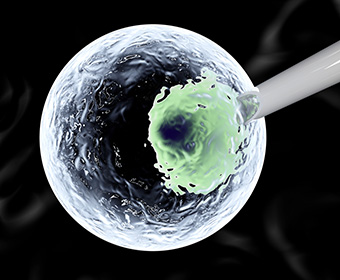UTSA study describes drug that could prevent infertility in cancer patients

Artist's illustration of DNA being injected into a stem cell.
(Feb. 13, 2017) -- A new study led by Brian Hermann, assistant professor of biology at The University of Texas at San Antonio (UTSA), shows promising evidence that a medication previously used to prevent infections in cancer patients can also keep them from becoming infertile. Losing fertility is a frequent problem among cancer patients, as treatments for the disease often halt sperm production.
Hermann and his research team have been pursuing a number of cutting-edge research initiatives to restore fertility in men who have lost their ability to have children as a result of cancer treatments they received as children. While working on methods to restart sperm production, the researchers discovered a link between a drug for recovering cancer patients and the absence of normal damage to reproductive ability.
The drug is called G-CSF or granulocyte colony-stimulating factor. It stimulates the bone marrow to produce neutrophils, which are white blood cells that are needed to fight infections. They're commonly lost after chemotherapy and radiation treatments.
"We were using G-CSF to prevent infections in our research experiments," Hermann said. "It turned out that the drug also had the unexpected impact of guarding against male infertility."
Because cancer treatments like radiation and chemotherapy often kill sperm stem cells, male reproduction becomes essentially impossible. In Hermann's laboratory, G-CSF, by promoting cell growth, unexpectedly began creating new sperm stem cells to replace the dead ones.
A study authored by Hermann and his students was recently published in Reproductive Biology and Endocrinology. Hermann's laboratory focuses almost exclusively on regenerating dead testicular tissue through the use of stem cells, making the project an exciting but unexpected detour that he hopes to continue, if possible.
The next step would be observing whether the drug, which is already in wide use by cancer patients, has any correlation with restored fertility among humans. Until then, Hermann is focusing on better understanding the stem cells that make reproduction possible, so he can find more effective solutions to treating male infertility.
"Male infertility is an intuitive disease and we need creative solutions," he said. "But we need to understand how things work before we can fix them."
UTSA is ranked among the top 400 universities in the world and among the top 100 in the nation, according to Times Higher Education.
-------------------------------
Read Brian Hermann's study, "Granulocyte colony-stimulating factor (G-CSF) promotes spermatogenic regeneration from surviving spermatogonia after high-dose alkylating chemotherapy."
Learn more about the UTSA Department of Biology.
Connect with UTSA online at Facebook, Twitter, YouTube, Instagram and LinkedIn.
Events
Late Night at the Rec is an awesome UTSA tradition that turns a typical information session into an exciting night of fun. It's a unique opportunity to meet new people and reconnect with old friends.
Campus RecreationCheer on the UTSA Soccer team as they take on Lamar in the first home game of the season.
Park West FieldShow your UTSA pride with our spirited crew—Rowdy, Cheer, the Spirits of the Roadrunner, and the incredible Spirit of San Antonio Marching Band (SOSA)—as we light up the night in true Roadrunner style.
Main Campus East Lawn, Main CampusAnnual Giving will host a First Day of School celebration to welcome students back to campus. We will have giveaways and photo opportunities.
Sombrilla Plaza, Main CampusEnjoy snacks while connecting with Adobe reps and student ambassadors. Download or log into the Adobe Express app to snag swag and unlock exclusive back-to-school templates. It’s a fun, fast way to get creative and start the school year with bold moves.
Central Plaza, Main CampusCelebrate the merger of UTSA and UT Health San Antonio with a pop-up featuring free t-shirts, exclusive swag, and interactive photo opportunities. Open to all students, faculty and staff. Supplies are limited!
Sombrilla Plaza, Main CampusHuddle Against Hunger is a fundraising competition with Texas State that benefits our Roadrunner Pantry. Donations this week will help UTSA earn additional prize monies provided by RBFCU.
In-Person and Virtual

